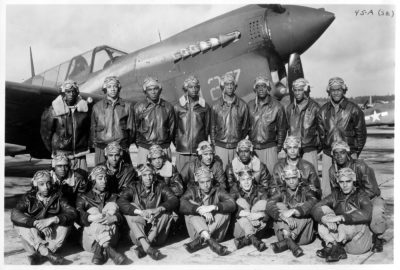February 2018 Monthly Letter
Dear Reconciler Family,
 “Fighting on Two Fronts – A Tuskegee Airman Remembers.”
“Fighting on Two Fronts – A Tuskegee Airman Remembers.”
This year, 2018 will be an important year in race relations with Memphis, Tennessee gearing up for the 50th anniversary of Martin Luther King, Jr.’s death, which took place on Thursday, April 4, 1968. In that commemorative spirit, I asked Pastor Neil Earle, a church leader, to revive an interview I did in 2010 with one of the last famed Tuskegee Airman.
At age 82 (now 90), William “Bill” Hicks has a grace-filled demeanor and approach to life that makes you want to adopt him as your special grandfather. Bill, a deacon in the Grace Communion International congregation in Charlotte, North Carolina, is a devoted Christian and a proud father and grandfather who considers the best day of his life was when a girl named Gertrude Melton dropped into his electronic repair shop. Under the pretense of a 45-minute talk about this girl’s battery and radio cabinet needs, Bill knew he had found his true love.
“I had her address because of the repair job,” he recalls with a fondness in his voice, “so that let me ask her to be my secretary, and later my wife.” Four children and grandchildren later, it says a lot about Bill Hicks that family matters loom as the highlight of his life. It says a lot because Bill Hicks was a ground crew mechanic for the 322nd Fighter Group of the U.S. Army Airforce in World War II, the famed “Tuskegee Airmen” or” Black Birdmen,” as the Germans used to call them. The Allies called these airmen “Red Tails” or “Red-Tail Angels,” because of the distinctive crimson paint prominently visible on the tail section of the unit’s aircraft.
African Americans desperately wanted to serve their country but racism was endemic! Not until 1948 would President Harry Truman desegregate the Armed Forces. Meanwhile, the U.S. Congress overcame heavy legislation lobbying to call into being a special group of pilots and air crew from the black population. The prejudice was fierce. The War Department set up requirements for flight experience and levels of education that they expected would be debilitating.
That policy backfired as qualified applicants poured in, and one of them was young Bill Hicks. “I was sent to Illinois and then to just outside Detroit for a group called the 100th Fighter Squadron. There were three squadrons to a group so Captain Benjamin Davis was called back from North Africa to head up the 99th squadron in Alabama.
Davis was the son of the first black West Point graduate. He was not easily deterred by harassments, such as a scientific report by the University of Texas, which purported to show that Negroes possessed too low intelligence to handle such complex operations as air combat. This report insinuated that they might jeopardize the war effort!
The 99th, 100th, 301st and 302nd were combined to form the all-black 332nd Fighter Group. They operated with the Fifteenth Air Force from May 1944 to April 1945, being engaged primarily in protecting bombers that struck such objectives as oil refineries, factories, airfields, and marshaling yards in Italy, France, Germany, Poland, Czechoslovakia, Austria, Hungary, Yugoslavia, Romania, Bulgaria, and Greece. They also made successful strafing attacks on airdromes, railroads, highways, bridges, river traffic, troop concentrations, radar facilities, power stations, and other targets. The unit received a Distinguished Unit Citation award. This shows what we as children of God can do if we put our hearts and courage to it!


